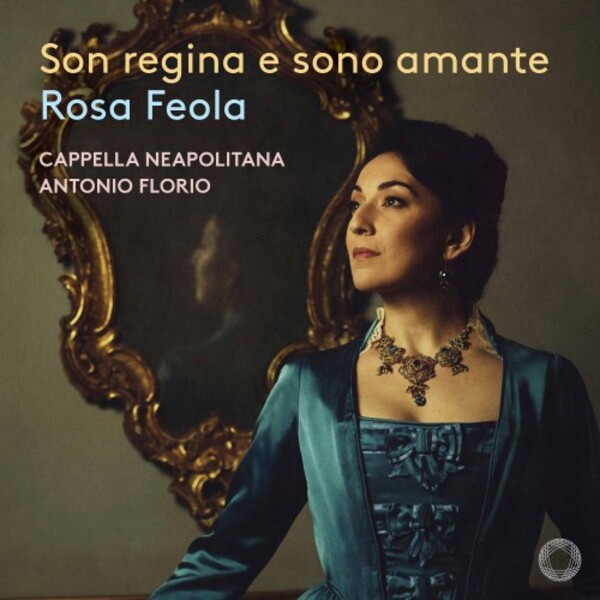PICCINI Son regina e sono amante (Rosa Feola)
View record and artist detailsRecord and Artist Details
Genre:
Opera
Label: Pentatone
Magazine Review Date: 05/2025
Media Format: CD or Download
Media Runtime: 66
Mastering:
DDD
Catalogue Number: PTC5187 361

Tracks:
| Composition | Artist Credit |
|---|---|
| Artaserse, Movement: Mi credi spietata |
(Vito) Niccolò (Marcello Antonio Giacomo) Piccinni, Composer
Antonio Florio, Conductor Cappella Neapolitana Rosa Feola, Soprano |
| Atys, Movement: Tremblez ingrats de me trahir |
(Vito) Niccolò (Marcello Antonio Giacomo) Piccinni, Composer
Antonio Florio, Conductor Cappella Neapolitana Rosa Feola, Soprano |
| La capricciosa, Movement: Signora padroncina |
(Vito) Niccolò (Marcello Antonio Giacomo) Piccinni, Composer
Antonio Florio, Conductor Cappella Neapolitana Rosa Feola, Soprano |
| Ciro riconosciuto, Movement: Ognor tu fosti |
(Vito) Niccolò (Marcello Antonio Giacomo) Piccinni, Composer
Antonio Florio, Conductor Cappella Neapolitana Rosa Feola, Soprano |
| Didon, Movement: Ah que je fut bien inspirée |
(Vito) Niccolò (Marcello Antonio Giacomo) Piccinni, Composer
Antonio Florio, Conductor Cappella Neapolitana Rosa Feola, Soprano |
| Didone abbandonata, Movement: Son regina e sono amante |
(Vito) Niccolò (Marcello Antonio Giacomo) Piccinni, Composer
Antonio Florio, Conductor Cappella Neapolitana Rosa Feola, Soprano |
| (le) donne vendicate, 'The Revenge of the Women', Movement: Ouvertura |
(Vito) Niccolò (Marcello Antonio Giacomo) Piccinni, Composer
Antonio Florio, Conductor Cappella Neapolitana Rosa Feola, Soprano |
| (Le) faux Lord, Movement: O nuit! Déesse du mystere |
(Vito) Niccolò (Marcello Antonio Giacomo) Piccinni, Composer
Antonio Florio, Conductor Cappella Neapolitana Rosa Feola, Soprano |
| Il finto turco, Movement: Andantino cantabile |
(Vito) Niccolò (Marcello Antonio Giacomo) Piccinni, Composer
Antonio Florio, Conductor Cappella Neapolitana Rosa Feola, Soprano |
| La schiava, Movement: Andante con moto |
(Vito) Niccolò (Marcello Antonio Giacomo) Piccinni, Composer
Antonio Florio, Conductor Cappella Neapolitana Rosa Feola, Soprano |
| Lo stravagante, Movement: Majo p’e la capo |
(Vito) Niccolò (Marcello Antonio Giacomo) Piccinni, Composer
Antonio Florio, Conductor Cappella Neapolitana Rosa Feola, Soprano |
| Zenobia, Movement: Sinfonia |
(Vito) Niccolò (Marcello Antonio Giacomo) Piccinni, Composer
Antonio Florio, Conductor Cappella Neapolitana Rosa Feola, Soprano |
Author: Richard Wigmore
A candidate for the most prolific opera composer of his day – and there was plenty of competition – Niccolò Piccinni is nowadays remembered primarily for his sentimental comedy La buona figliuola and for being pitted against Gluck in the Parisian pamphlet wars of the 1770s. There’s not a note of his most famous and influential opera here. Instead Rosa Feola and conductor/editor Antonio Florio offer a conspectus of Piccinni’s career, from the Neapolitan opera seria Ciro riconosciuto of 1759 to Didon, a triumph at the Paris Opéra in 1783. Virtually all the music is recorded for the first time.
A contemporary wrote that Piccinni’s forte was ‘the naive and the tender’: a verdict borne out by the graceful lines of Didon’s ‘Ah que je fut bien inspirée’ and a gently plaintive siciliano from the opéra comique Le faux lord – a lovely piece, this. One or two numbers strike me as no more than agreeably generic. Harmonic imagination was never Piccinni’s strong point, even in his later works for Paris. But Feola’s selection includes a fine minor-key outpouring of despair from Artaserse and – perhaps the highlight of the whole disc – a seething ‘vengeance’ aria from another of Piccinni’s Parisian triumphs, Atys.
Best known for her Donizetti and Verdi roles (including an unforgettable Gilda at Covent Garden), Rosa Feola brings to these various queens, lovers and maids shining tone, elegance of style and a vivid way with the texts. She soars freely above the stave in the aria from Didone abbandonata that gives the disc its title and unleashes reserves of power in the Atys aria, egged on by precipitately tumbling violins. Feola is a deft comedienne, too, whether in a sparky number from La capricciosa or tracing a crescendo of exasperation with her chauvinist lover in the aria in Neapolitan dialect that ends the recital.
All the while Antonio Florio gets prompt and energetic playing from Cappella Neapolitana, taking care to keep the ubiquitous repeated bass lines buoyant. There’s an informative, if not quite idiomatically translated, note from Dinko Fabris. But – and it’s a serious but – the arias and the interleaved sinfonias are performed in slimmed-down versions for a small string band, plus bassoon and continuo. Piccinni was praised by contemporaries for his colourful orchestration, with good reason. In the Didon aria Rosa Feola is in a different class from the soprano on a live recording of the opera from Bari (Dynamic, 2003). Yet when you hear Piccinni’s delicate wind colouring in that Bari performance, you realise what you’re missing.
Discover the world's largest classical music catalogue with Presto Music.

Gramophone Digital Club
- Digital Edition
- Digital Archive
- Reviews Database
- Full website access
From £8.75 / month
Subscribe
Gramophone Full Club
- Print Edition
- Digital Edition
- Digital Archive
- Reviews Database
- Full website access
From £11.00 / month
Subscribe
If you are a library, university or other organisation that would be interested in an institutional subscription to Gramophone please click here for further information.




